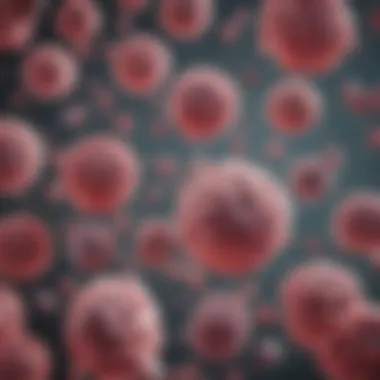Monoclonal Antibodies: Transforming Cancer Treatment


Intro
Monoclonal antibodies have significantly shifted the landscape of cancer treatment in recent years. Their unique ability to target specific antigens on cancer cells allows for more precise therapies, minimizing damage to healthy tissues. As therapies evolve, understanding their mechanism, clinical applications, and advancements in biotechnology becomes indispensable for those involved in this field.
Research Overview
Summary of Key Findings
The research consistently indicates that monoclonal antibodies enhance the efficacy of traditional treatments, such as chemotherapy and radiation. By binding specifically to tumor antigens, these therapies can induce cell death, block growth signals, and recruit immune cells to combat cancer. Studies show improved patient outcomes in various malignancies, including lymphoma and breast cancer.
Research Objectives and Hypotheses
The primary goal of this research is to analyze how monoclonal antibodies affect tumor growth and overall patient survival. The hypothesis is that integrating monoclonal antibodies into treatment regimens leads to a statistically significant increase in survival rates, compared to standard treatments alone. Additionally, we aim to identify specific biomarkers that predict the effectiveness of these therapies.
Methodology
Study Design and Approach
This investigation employs a mixed-methods approach combining quantitative and qualitative data. Clinical trials data form the base, complemented by patient surveys to grasp lived experiences with monoclonal therapies. We also analyze recent advancements in this domain to identify trends and future directions.
Data Collection Techniques
Data were collected through clinical trial registries, peer-reviewed journals, and interviews with oncology professionals. The focus remains on high-quality evidence from multidimensional sources to ensure comprehensive coverage of current findings.
Monoclonal antibodies represent a frontier in cancer therapy, providing previously unseen precision in treatment options.
These methods provide a solid foundation for the exploration of monoclonal antibodies in oncology, addressing key issues and emerging challenges in their application.
Foreword to Monoclonal Antibodies
Monoclonal antibodies represent a significant advancement in cancer treatment over the past few decades. Their unique properties allow for targeted therapy, which minimizes harm to healthy cells while attacking cancerous ones. This targeted nature also leads to fewer side effects compared to traditional chemotherapy. It is vital to understand the role of monoclonal antibodies to appreciate their impact on patient outcomes and the evolution of cancer therapies.
Monoclonal antibodies are artificially produced antibodies designed to bind to specific antigens on cancer cells. Their precision and effectiveness have paved the way for new treatment protocols, making them an indispensable part of oncological practice. Understanding the mechanisms that govern these entities offers insight not just into their function, but also their significance in the broader landscape of cancer treatment.
Defining Monoclonal Antibodies
Monoclonal antibodies are identical copies of an antibody produced by a single clone of immune cells known as plasma cells. They are engineered to recognize a specific marker, or antigen, on cancer cells. Because each monoclonal antibody specifically targets a unique antigen, they can be tailored to treat various cancer types.
The ability to produce homogeneous and highly specific antibodies has revolutionized medical research. Furthermore, their usage spans numerous applications beyond oncology, including autoimmune diseases and infectious diseases. This specificity reduces the risk of off-target effects, making monoclonal antibodies a crucial tool in targeted therapies.
History and Development
The history of monoclonal antibodies started with significant breakthroughs in the 1970s, notably with the work of Cesar Milstein and Georges Köhler. They developed the hybridoma technology, which allowed for the production of a single type of antibody. This technology revolutionized the field of immunology and laid the groundwork for developing therapeutic antibodies.
Since then, there have been numerous advancements in antibody engineering. Early monoclonal antibodies were derived from murine sources, leading to high immunogenicity in humans. The subsequent development of chimeric and humanized antibodies addresses this limitation and improves patient tolerance. As a result, monoclonal antibodies have transitioned from being merely research tools to becoming mainstays of cancer treatment protocols.
The ongoing refinements in development and production techniques continue to expand the repertoire of available monoclonal antibodies. Today, the use of recombinant DNA technology enhances their design and efficacy, ensuring that the therapeutic antibodies are not only more potent but also more versatile in application.
Mechanism of Action
The mechanism of action of monoclonal antibodies is fundamental to their role in cancer treatment. Understanding how these antibodies interact with specific targets within the body is crucial for appreciating their effectiveness. Their precision in targeting cancer cells adds significant benefits to treatment protocols, leading to improved patient outcomes. By investigating this mechanism, researchers can also identify possible challenges and limitations inherent in this therapeutic approach.
Binding to Antigens
Monoclonal antibodies function primarily through binding to specific antigens present on the surface of cancer cells. These antigens are unique proteins that can help differentiate cancer cells from normal cells. This specific binding is crucial, as it allows the immune system to identify and attack the cancerous cells effectively.
The binding process can initiate several actions:
- Direct Inhibition: By attaching to the antigen, monoclonal antibodies can inhibit signals that promote cell division, thus slowing or stopping tumor growth.
- Signal Induction: The interaction can also trigger signal transduction pathways that lead to apoptosis, or programmed cell death, in malignant cells.


It is important to note that the strength and specificity of the antibody-antigen interaction are vital. High-affinity binding enhances the therapeutic effects, while low-affinity binding may not produce the desired impact.
Activation of Immune Response
Once monoclonal antibodies bind to their target antigens, they play an essential role in activating the immune response. This occurs through various mechanisms:
- Recruitment of Immune Cells: Monoclonal antibodies can recruit immune cells, such as T-cells and natural killer cells, to the site of the tumor. These cells then work to destroy the cancer cells directly.
- Complement Activation: Another critical action involves the activation of the complement system, a group of proteins that enhance the ability of antibodies and phagocytic cells to clear pathogens and damaged cells.
- Antibody-Dependent Cell-Mediated Cytotoxicity (ADCC): This is a process where immune cells recognize and kill antibody-coated target cells, leading to a more efficient immune attack against the tumor.
By fundamentally altering how the immune system interacts with cancer, monoclonal antibodies leverage the body’s defense mechanisms to fight malignancies. This dual function of binding and subsequent immune activation represents a sophisticated mechanism aimed at promoting the destruction of cancer cells.
Types of Monoclonal Antibodies
The classification of monoclonal antibodies is essential for understanding how they can be utilized in cancer treatment. Each type offers unique properties and benefits, influencing their efficacy, safety, and applicability within various therapeutic contexts. Knowledge of these distinctions aids in choosing the right monoclonal antibodies for clinical use, optimizing therapeutic strategies for cancer patients.
Murine Monoclonal Antibodies
Murine monoclonal antibodies are derived from mouse cells. They were among the first types developed for therapeutic purposes. While effective in certain scenarios, they present specific challenges and limitations. One significant concern is immunogenicity; the human immune system often recognizes these antibodies as foreign, triggering an immune response. This can lead to reduced effectiveness and possible adverse reactions in patients. Moreover, murine antibodies may not bind as effectively to human antigens as human-derived antibodies.
Nonetheless, murine monoclonal antibodies can be beneficial in preclinical research and certain applications. For example, they are commonly used in laboratory settings for detecting and quantifying proteins or other antibodies.
Chimeric Monoclonal Antibodies
Chimeric monoclonal antibodies represent a hybrid approach. They combine murine and human components to reduce immunogenicity while maintaining effectiveness. Typically, the variable region of murine antibodies, responsible for antigen specificity, is fused with a human constant region. The resulting antibodies exhibit enhanced compatibility with human immune systems, leading to a lower incidence of adverse reactions.
Chimeric antibodies have shown considerable success in clinical settings, particularly in treating disorders like lymphomas. Rituximab, a well-known chimeric monoclonal antibody, targets CD20 on B-cells, and has improved outcomes in specific blood cancers. Despite their advantages, some chimeric antibodies may still provoke immune responses, although to a lesser extent than their murine counterparts.
Humanized and Fully Human Monoclonal Antibodies
Humanized monoclonal antibodies are engineered to contain minimal murine sequences. This modification further reduces immunogenicity while retaining the binding properties essential for therapeutic effects. These antibodies have become increasingly important in targeted cancer therapies.
Fully human monoclonal antibodies, developed using advanced technologies like phage display, entirely consist of human sequences. They represent the pinnacle of antibody development, offering the lowest chance of immune reactions. An example includes the fully human antibody, adalimumab, used in treating various diseases, including certain cancers.
Overall, humanized and fully human monoclonal antibodies are preferred in modern oncology. They promise improved safety profiles and sustained efficacy, making them ideal for long-term cancer treatment strategies.
Clinical Applications
The clinical applications of monoclonal antibodies represent a significant evolution in cancer treatment strategies. These therapies offer targeted approaches that minimize damage to healthy cells while maximizing the effect on malignant cells. The specificity and adaptability of monoclonal antibodies allow for more personalized treatment plans for patients, making it essential to explore the various applications in the clinical realm.
Targeted Therapy in Solid Tumors
Monoclonal antibodies have become a cornerstone in the treatment of solid tumors, including breast, lung, and colorectal cancers. They function primarily by recognizing and binding to specific antigens present on tumor cells. This binding activates the immune system to attack the cancer, which helps control tumor growth and spread.
For example, the drug Trastuzumab, widely known as Herceptin, targets the HER2 receptor in some breast cancers. This targeted approach not only improves response rates but often results in better overall survival rates for patients compared to traditional chemotherapy.
List of key benefits in targeted therapy for solid tumors:
- Precision: Focuses on specific cancer cells, reducing side effects.
- Efficacy: Improved therapeutic outcomes in resistant disease settings.
- Dual Mechanisms: Certain monoclonal antibodies can also recruit immune effector cells, enhancing their effects.
Applications in Hematological Malignancies
In hematological malignancies, monoclonal antibodies like Rituximab play a vital role in the treatment of lymphoma and some leukemias. These antibodies are designed to target specific markers on the surface of cancerous B cells.
The mechanism here also involves direct cytotoxicity and the enhancement of immune-mediated responses. In cases like non-Hodgkin lymphoma, the layering of monoclonal antibody therapy with chemotherapy has shown to improve remission rates substantially.
Key considerations in using monoclonal antibodies for blood cancers include:
- Safety: Reduced toxicity compared to systemic therapies.
- Combination Potential: Often used alongside other treatment modalities to enhance overall effectiveness.
- Monitoring: Continuous assessment of antibodies can provide insights into treatment response and adjustment needs.
Combination Therapies
The use of monoclonal antibodies in combination with other cancer therapies has gained considerable attention. By integrating multiple treatment modalities, the likelihood of overcoming drug resistance increases while also enhancing response rates.


For instance, combining monoclonal antibodies with immune checkpoint inhibitors has shown promise in various cancers. This combination aims to boost the immune system further, resulting in a more vigorous attack on the tumor.
Some notable combinations include:
- Pembrolizumab with Trastuzumab: Effective against HER2-positive breast cancer.
- Nivolumab with Rituximab: Demonstrated effectiveness in specific lymphoma types.
Advancements in Monoclonal Antibody Technology
The constant evolution of monoclonal antibody technology is significant to cancer treatment. These advancements shape how clinicians approach therapy and enhance the effectivity of treatments. Understanding these innovations helps both professionals and patients recognize the potential for better clinical outcomes. The field is fertile with research, and this section will explore key components of technological progress.
Recombinant DNA Technology
Recombinant DNA technology is essential for creating specific monoclonal antibodies. This process involves combining DNA from different sources to produce new genetic combinations. It allows scientists to alter the nucleotide sequences of genes that encode antibodies, leading to the production of highly specific antibodies that can target cancer cells more effectively.
The significance of this technology is manifold:
- Increased specificity: Recombinant technology allows for the design of antibodies that precisely recognize antigens associated with cancer cells.
- Improved production efficiency: It streamlines the production process, ensuring that large quantities of monoclonal antibodies can be generated quickly and consistently.
- Customization: Researchers can develop antibodies tailored to particular patient needs, leading to personalized treatment options.
By utilizing recombinant DNA technology, researchers can address the limitations of earlier antibodies that were not as precisely targeted. As a result, these therapeutics are moving towards a more individualized approach to cancer treatment.
Engineering for Enhanced Efficacy
The engineering of monoclonal antibodies focuses on augmenting their therapeutic efficacy. Scientists employ various techniques to modify antibodies, making them more effective in combating cancer. One notable approach is the optimization of the antibody's structure to enhance binding affinity to target antigens.
Key methods include:
- Afucosylation: This process removes fucose from the antibody structure, which increases binding strength to immune cells, enhancing the immune response.
- Bispecific antibodies: These engineered antibodies can bind to two different antigens simultaneously. This is especially useful in redirecting immune cells to cancer cells.
- Antibody-drug conjugates: Here, cytotoxic drugs are linked to antibodies. This method helps deliver drugs directly to cancer cells, minimizing damage to healthy cells and improving toxicity profiles.
These engineering strategies are in the forefront of monoclonal antibody evolution, helping create next-generation therapies that are both effective and minimize adverse effects. Enhancing the efficacy of monoclonal antibodies through these advanced techniques symbolizes a pivotal step in transforming cancer treatment practices.
"The future of cancer therapy lies not just in discovering new drugs but in refining those that already exist to maximize their potential."
In summary, advancements in monoclonal antibody technology underscore the ongoing transformation in cancer treatment strategies. The integration of recombinant DNA technology and various engineering methods promises more targeted and effective therapies, ultimately improving patient outcomes.
Ongoing Research and Trials
The landscape of cancer treatment continues to evolve, with monoclonal antibodies at the forefront of this change. Ongoing research and clinical trials are crucial in validating the efficacy and safety of new therapies. They provide insights that can improve patient outcomes, expand the applications of existing drugs, and discover novel treatment options. Understanding the current state of these trials and the emerging targets for monoclonal antibodies is essential for anyone studying or working in cancer treatment.
Current Clinical Trials
Current clinical trials are integral to assessing new monoclonal antibodies. These trials dictate how these therapies can be optimally applied in real-world settings. Researchers focus on several key areas in these trials:
- Efficacy against specific types of cancer, such as breast or lung cancer.
- Safety profiles compared to existing treatment methods.
- Potential for reduced side effects.
- Outcomes measured include overall survival rates, progression-free survival, and quality of life metrics.
Focusing on specific cancers helps streamline research efforts. For example, trials for Pembrolizumab in melanoma have shown significant success, prompting further investigation.
*
The advancement in monoclonal antibody therapies relies heavily on rigorous, ongoing research to prove their benefits in clinical settings.
*
Emerging Targets and Strategies
As monoclonal antibody therapies mature, new targets and strategies are emerging. Researchers are identifying unique antigens on cancer cells that could be beneficial for therapeutic intervention. Some notable strategies include:
- Development of bispecific antibodies, designed to target two different antigens simultaneously.
- Antibody-drug conjugates, which attach chemotherapy agents directly to antibodies, enhancing the precision of treatment.
- CAR-T cell therapies that combine aspects of monoclonal antibody technology with advanced immunotherapy techniques.
Emerging targets will likely guide the next phase of clinical trials. For example, trials focusing on the feasibility of treating solid tumors with novel monoclonal antibodies are generating considerable excitement in the community. This pushes the boundaries of what monoclonal antibodies can accomplish in the oncology field.
In summary, ongoing research and trials are critical for the advancement of monoclonal antibodies in cancer treatment. They not only validate existing therapies but also uncover promising new avenues for combatting various cancers, thus enhancing the future of patient care.


Challenges and Limitations
The deployment of monoclonal antibodies in cancer treatment presents numerous challenges and limitations that impact their efficacy and safety. Understanding these factors is crucial for researchers, healthcare providers, and patients. These challenges must be addressed for the effective application of monoclonal antibodies in clinical settings, as they can influence overall patient outcomes and treatment success.
Immunogenicity
Immunogenicity refers to the ability of a substance, such as monoclonal antibodies, to provoke an immune response. This characteristic can lead to adverse effects in patients. When monoclonal antibodies are administered, the patient's immune system may identify them as foreign substances. In some cases, this immune reaction could neutralize the therapeutic effects of the antibody. There are several potential repercussions of immunogenicity:
- Reduced Efficacy: If the immune system attacks the therapeutic antibody, the desired treatment outcome may not be achieved. This situation is particularly problematic when these antibodies are intended to target specific cancer cells.
- Allergic Reactions: Patients may experience allergic reactions or infusion-related reactions due to the immune response against the monoclonal antibody. These reactions can range from mild to severe and can complicate treatment regimens.
- Need for Desensitization: In some instances, premedication or desensitization protocols are necessary to reduce the risk of allergic reactions. This adds complexity to treatment planning.
Thus, managing immunogenicity is essential. Researchers are investigating various strategies, including humanization of antibodies and using next-generation platforms, to reduce the immunogenic potential of these treatments.
Resistance Mechanisms
Resistance mechanisms present another significant challenge in the use of monoclonal antibodies for cancer treatment. Cancer cells can adapt and develop resistance to the effects of therapy, leading to treatment failure. These resistance mechanisms can be divided into several categories:
- Target Alterations: Cancer cells may modify the antigens that monoclonal antibodies target. This alteration can prevent the antibody from binding effectively, thus diminishing its therapeutic potential.
- Pathway Compensation: When one signaling pathway is disrupted by treatment, cancer cells can activate alternative pathways. This adaptive response enables them to survive and continue proliferating in the presence of monoclonal antibodies.
- Tumor Microenvironment: The tumor microenvironment can also promote resistance. Factors within this space may shield cancer cells from the effects of monoclonal antibodies, making it challenging to achieve successful outcomes.
"Understanding the resistance mechanisms is critical for the development of combination therapies that target multiple pathways. This approach may enhance treatment efficacy."
Future Perspectives
Exploring Future Perspectives in the realm of monoclonal antibodies is crucial in understanding their evolving role in cancer treatment. As research continues to expand, it becomes evident that the future of these therapies lies not only in improved efficacy but also in personalization to meet individual patient needs. This section elaborates on the advancements and implications of next-generation antibodies and personalized medicine approaches.
Next-Generation Antibodies
Next-generation antibodies represent a significant evolution in therapeutic options. These include bispecific antibodies that can bind to two different antigens, enhancing their effectiveness in targeting cancer cells. Innovations such as antibody-drug conjugates are also gaining traction. These conjugates facilitate the delivery of cytotoxic drugs directly to cancer cells, minimizing damage to surrounding healthy tissue.
The development of novel antibodies is driven by enhanced engineering techniques and a deeper understanding of tumor biology. Techniques like phage display and recombinant DNA technology allow for the tailored creation of antibodies with improved binding affinity and specificity.
Potential benefits of next-generation antibodies include:
- Increased specificity: Reducing off-target effects and improving patient outcomes.
- Combination applications: Allowing for synergistic effects when combined with existing therapies.
- Potential for new targets: Unlocking pathways previously deemed inaccessible.
This evolving landscape suggests that these next-generation antibodies could significantly alter the treatment paradigm, making cancer therapies more targeted and efficient.
Personalized Medicine Approaches
Personalized medicine is a transformative concept in healthcare that tailors treatment to individual patient profiles. In the context of monoclonal antibodies, this approach can lead to more effective and less toxic cancer therapies.
Personalized therapy involves analyzing a patient's specific tumor markers to identify the most suitable monoclonal antibody. For instance, HER2-positive breast cancer patients derive substantial benefit from trastuzumab, a tailored treatment targeting the overexpression of the HER2 protein.
Key considerations for personalized medicine include:
- Genomic profiling: Understanding the genetic makeup of the tumor allows for targeted treatment selection.
- Patient stratification: Classifying patients based on biomarkers can optimize dosing and improve therapeutic outcomes.
- Monitoring treatment response: Using biomarkers to assess the effectiveness of treatments steadily and adjust strategies accordingly.
Through personalized approaches, future cancer treatments may maximize benefits while reducing the risk of adverse effects. This paradigm shift emphasizes the importance of patient-specific data in developing effective monoclonal antibody therapies for cancer management.
"The aim is not only to treat cancer effectively but to do so in a way that respects the individual needs of each patient."
As research progresses and technologies advance, the landscape of monoclonal antibody treatments will continue to evolve, shaping the future of cancer therapy in profound ways.
Ending
Monoclonal antibodies have reshaped the landscape of cancer treatment. Their targeted approach allows for better specificity, reducing damage to healthy cells while effectively attacking malignant ones. The conclusion of this article highlights the essential role these therapies play in modern oncology. Concentrating on various dimensions, this section emphasizes key benefits and considerations regarding monoclonal antibody usage.
Summary of Key Points
Monoclonal antibodies function primarily through binding to specific antigens present on cancer cells. This targeted action activates immune responses that result in cell death, showcasing their effectiveness in various types of cancer, including solid tumors and hematological malignancies. Sections discussed earlier included mechanisms of action, types of monoclonal antibodies, clinical applications, advancements in technology, ongoing research, challenges, and future perspectives. Each of these areas presents unique insights into how these antibodies can improve patient outcomes.
Implications for Cancer Treatment
The implications of monoclonal antibodies in cancer treatments are profound. Their ability to provide personalized and precise therapeutic regimens is not just revolutionary; it is fundamentally changing the way oncologists approach treatment plans. As the technology continues to advance, these monoclonal antibodies may become increasingly integrated into combination therapies, paired with conventional treatments for enhanced effectiveness. The future of oncology lies in the capability to tailor treatments to individual characteristics, allowing for improved survivorship and quality of life for patients. Ongoing research remains critical in overcoming barrier such as immunogenicity and resistance mechanisms that may limit their effectiveness. By continually refining these therapies, the treatment landscape can expand further, promising more effective outcomes in the battle against cancer.
"Through monoclonal antibodies, we are witnessing a shift towards more personalized, targeted therapies in oncology, providing hope where conventional methods fall short."
The concluding insights integrate the rich narrative of monoclonal antibodies into a cohesive understanding, illustrating their vital importance in the continuum of cancer treatment.















